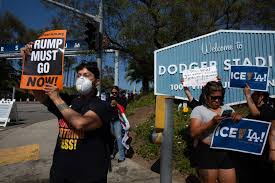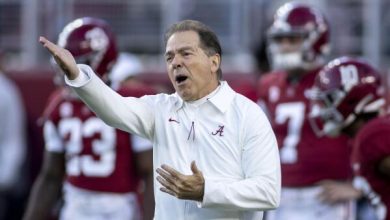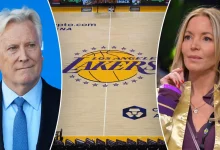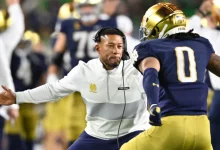The Los Angeles Dodgers, facing mounting pressure from their Latino fan base, announced on Friday that they had committed $1 million in financial help for families of immigrants who have been “impacted by recent events in the region.

The Los Angeles Dodgers, a storied franchise deeply embedded in the civic and cultural fabric of Southern California, publicly broke their silence on a wave of recent immigration-enforcement raids with a bold announcement: a $1 million commitment to assist immigrant families who have been “impacted by recent events in the region.” This marks the team’s first significant public response amid growing demands from their sizable Latino fan base—including players, former broadcasters, fans, and civic leaders—to take a stand.
Since federal agents conducted workplace raids and made mass arrests in the region, including near Dodger Stadium itself, pressure has been mounting. Hundreds staged protests; local unions and civic organizations launched petitions; and the team’s silence became untenable. Congressman Jimmy Gomez—whose district overlaps heavily with Dodgers fans—went so far as to call any remaining silence “a betrayal and an insult” . The tension reached a crescendo when ICE agents briefly appeared at the stadium, prompting the organization to request their departure—drawing emphatic backlash and concern from the fan community .
On Friday, June 20, the Dodgers finally spoke through action. Through a carefully worded release, CEO Stan Kasten emphasized responsibility and empathy, stating:
“What’s happening in Los Angeles has reverberated among thousands upon thousands of people, and we have heard the calls for us to take a leading role on behalf of those affected,”
While the team notably avoided directly condemning federal policy, they anchored the pledge in supporting “families of immigrants impacted by recent events in the region.”
The Dodgers plan to channel the funds via partnerships with established community players: the California Community Foundation, the Los Angeles County Federation of Labor, and other local nonprofit groups. This approach ensures the money provides legal aid, mental-health support, rent assistance, and basic needs to those most affected.
Dodgers manager Dave Roberts was unequivocal, calling the pledge “the right thing to do.” Player Kiké Hernández, who has used his platform to condemn the raids, echoed the sentiment, voicing solidarity with immigrant families on social media.
Mayor Karen Bass praised the move, noting that recent enforcement operations have “sent shockwaves of fear … rippling through every neighborhood” and “had a direct impact on our economy,” adding that Los Angeles must stand united. U.S. Rep. Gomez highlighted the symbolism of the Dodgers stepping forward, given the city’s demographic ties—36 percent of Los Angeles residents are immigrants, and Latinos represent approximately 40 percent of the team’s fan base.
Though this financial commitment is substantial, reactions have varied. Some see it as overdue but essential: a tangible gesture in a climate of fear and uncertainty for immigrant communities. Others note it stops short of broader advocacy—like condemning the raids or lobbying for policy reforms. A coalition of over 50 community and labor leaders had explicitly urged the team to call for an end to the federal enforcement. The Dodgers declined to go that far, instead focusing on material aid.
The donation aligns with the team’s history of community engagement: they’ve previously given millions in crisis response—from rebuilding after Hurricane Maria to wildfire and pandemic relief efforts via the Dodgers Foundation. Yet in this case, the backdrop of political sensitivity is sharper, and the Latino fan base more directly engaged. Dodger Stadium itself has served as the crucible—where federal vehicles briefly stationed, protests erupted, and the Dodgers had to choose sides.
The decision shifts the narrative. It signals to their audience that the team sees itself as more than entertainment—it’s a civic institution capable of moral authority. It amplifies the understanding that sport and society are inseparable, especially in a city defined by its immigrant population.
Will this action resonate beyond public relations? Time will tell, but the model is already being praised. Coalition for Humane Immigrant Rights spokesperson Jorge‑Mario Cabrera applauded the initiative, underscoring that resources focused on “legal counsel, information and referrals, mental health, health emergencies, rent, and other basic needs” are exactly what impacted families require.
Looking ahead, the Dodgers appear poised to continue collaboration with the city and community organizations, potentially extending the reach of their commitment. It also puts pressure on other local institutions—sports franchises, corporations, civic groups—to follow suit in a moment where silence can be interpreted as complicity.
This pledge transforms anticipation into agency. It answers the calls of fans, officials, and players. It returns the Dodgers to a leadership role in Los Angeles society—whether on the diamond or off. And perhaps most importantly, it delivers real, measurable assistance to families living under the shadow of immigration enforcement—a step that could mark a turning point in how sports franchises wield influence in public crises.









